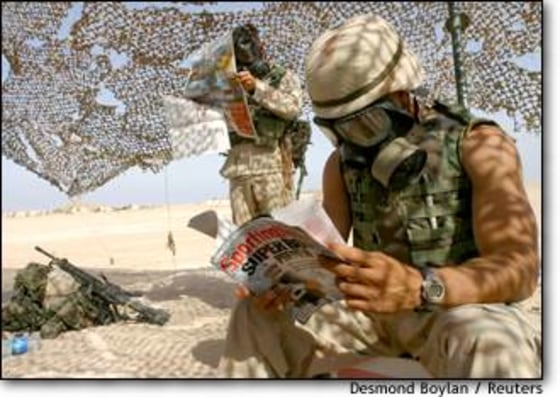Outside of Kuwait City, past the luxury homes and the seaside resorts, the desert takes over. For miles, the only accompaniment to the camels and their nomadic herders are the massive power lines, stretching to the horizon. At some point, these stop, too, and there is only featureless brown desert, the domain of spiny-tailed lizards and blowing sand. In this barren world, the U.S. Marines have been living for a month, staging for a probable attack into Iraq.
Life here has none of the luxuries of a conventional base. It is a village of canvas, 17 men in each tent, no electricity, no running water; for security reasons, no lights are allowed after dark.
Gas masks must be within arm’s reach at all times. The men are trained to don their masks instantly in case of attack; there are nine seconds, they are told, between life and death. The Marines sleep on the ground, stand in long lines for mediocre food and are allowed to shower every four days.
The amount of gear these men must carry is mind-boggling: Rifle, ammunition, body armor, helmets and Saratoga suits to protect against chemical warfare and helmets; their packs are filled with clothing, gear, trenching shovels, and sleeping bags. A difficult task in any terrain, but especially so here in the brutal desert heat.
There is nothing to do here, and there is everything to do. From dawn to dusk, and sometimes far into the night, these men train for war.
HIGH SPIRITS
Despite these hardships, the spirits of America’s elite rapid deployment force are high. Once night falls in this all-male environment, the voices of the men drift out of the tents. Card games, good-natured insults, war stories. Pictures of girlfriends, wives and family are exchanged. There are only rare, supervised opportunities to call home (calls are monitored for operational security) and the mail from home is only now beginning to trickle into camp.
The men have not been told when or where they will go; they only know that they are ready. Their commanders have told these young men exactly what they may encounter in battle, a sobering reality for Marines who have yet to taste combat.
There are daily reminders of the dangers — last letters to be written and given to a buddy for safekeeping, power of attorney to be signed, blood type to be written on boots, helmets, sleeves.
Away from their families and with no news of home, the men must entertain themselves. A ball appears and an impromptu touch football game is organized. One company holds regular wrestling matches. Rumors sweep the camp; the latest that singer and actress Jennifer Lopez was killed in a car crash, which eclipsed all concern over U.N. votes and the imminent war.
These men are here to represent the United States; they are here to do a job, they are prepared to do it or die trying, and they are increasingly frustrated that they are not being allowed to do that job.
They are proud to be Marines, and most proud of the graffiti in the men’s room at the Air Force base: “Marines go Home! We want our women back.”
(Sue Lackey is an MSNBC.com contributor now based in Camp Shoup, Kuwait.)
